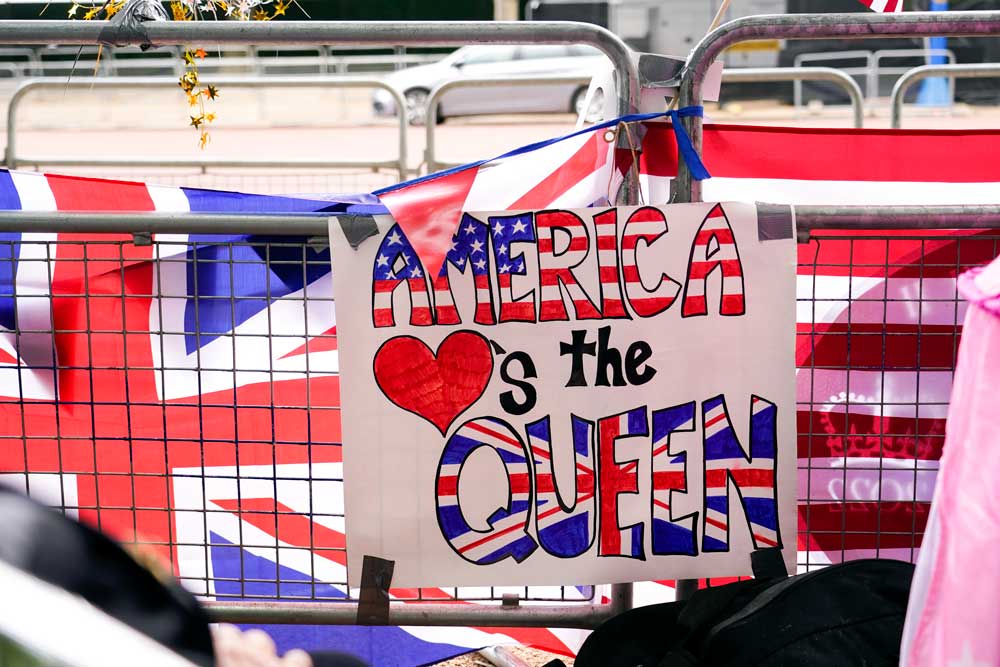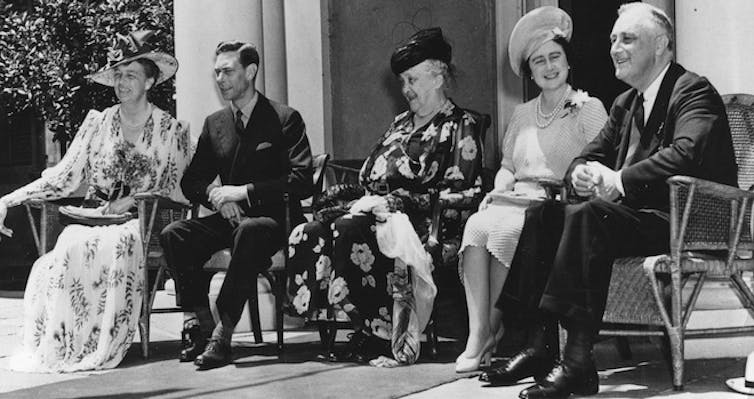
By Arianne Chernock
Whether it is reporting the role of the Sex Pistols or that of the royal corgis, U.S. media has suddenly taken an interest in a peculiar four-day ceremony taking place across the pond: Queen Elizabeth II’s Platinum Jubilee.
Starting on June 2, 2022, British subjects will be participating in street parties and other events marking the 70 years that the country’s monarch has remained on the throne. They won’t be alone in expressing affection for the queen.
In America, Elizabeth retains approval ratings that would leave most political leaders envious. And even if the most high-profile U.S.-based royalists – Prince Harry and his American wife Meghan Markle – intend to be in the U.K. for some of the ceremonies, many other supporters of Queen Elizabeth will be back in America, no doubt raising a cup of tea in her honor.
But what’s with Americans’ fascination with the British monarchy in the first place? It might seem strange, given the nation’s decision to sever ties with George III in 1776. No royal family from any other nation has induced the same level of scrutiny or celebration.
It’s important to recognize that British royals have been eliciting similar responses on American shores for the past 150 years
In 1860, Prince Albert Edward – the future King Edward VII – staged a surprisingly successful American tour, during which he was mobbed by fans in cities including Chicago; Albany, New York; and Detroit. In 1939, King George VI and Queen Elizabeth made similar headlines when they ate their first hot dogs in Hyde Park, New York, urged on by President Roosevelt and his wife, Eleanor.
And then there was the frenzy surrounding Prince Charles and Princess Diana’s visit to Washington in 1985. President Reagan may have mistakenly referred to Diana as “Princess David,” but no one will forget Diana’s turn on the dance floor with actor John Travolta.
Of course, there’s an element of pragmatism in the tradition of warm American receptions. After the American Revolution, the newly independent nation realized that it would need to maintain strong ties with the imperial motherland for diplomatic and security reasons; the War of 1812 proved to be the exception – rather than the rule – in 19th-century Anglo-American relations.
This “special relationship” would become only more vital during World War II and the Cold War that followed. President Roosevelt invited George VI to that picnic in 1939 not only to exchange pleasantries, but also to telegraph British and American unity in the face of German belligerence.

The National Archives
But the emotion on display during royal visits also suggests a deep affective tie. Although the American revolutionaries long ago rejected colonial government, there has always been a certain degree of ambivalence about the crown. The Colonists, after all, had felt an intense and personal relationship with George III, whom they regarded as distinct from the British Parliament, even as many came to question the concept of hereditary sovereignty.
As late as 1775, Alexander Hamilton would defend George III in his “The Farmer Refuted” on the grounds that George III was “king of America, by virtue of a compact between us and the kings of Great Britain.” As Hamilton went on to explain, “[T]o disclaim the authority of a British Parliament over us, does by no means imply the dereliction of our allegiance to British Monarchs.”
In the wake of the Revolution, the routines, symbols, rituals and attitudes associated with the crown proved difficult to sacrifice.
These thorny aspects of the transition from colony to nation have been addressed in works by historians and academics Elisa Tamarkin, Brendan J. McConville and, most recently, Eric Nelson. In “The Royalist Revolution,” Nelson even goes so far as to suggest, provocatively, that the nation’s founders crafted the American presidency with the image of a strong king in mind.
Not everyone will buy Nelson’s thesis, but there’s no denying that Americans have made their own political dynasties: Instead of the Windsors, we have the Kennedys, Bushes and Clintons.
In 2018, American actress Meghan Markle went one step further by marrying into the British royal family. Her relationship with the British press – and reportedly with some of her in-laws – hasn’t been the smoothest, leading to a move across the Atlantic to the U.S. for her and husband, Prince Harry.
But despite that one American’s experience, Americans tend to look favorably on the family’s head. A February 2022 poll of Americans found that 61% held a favorable view of Queen Elizabeth – the highest rating of any living member of the British royal family.
![]()
Arianne Chernock is Professor of History at Boston University.





























Guy says
Americans are not, it’s the nerworks jamming it down our throats
Dennis C Rathsam says
Why is this crap on every channel? Who care,s? The house of Windsor is nothing but a bunch of grafters.
beachcomberT says
Thanks for the essay to help celebrate QE 2’s remarkable anniversary. America’s love affair with the monarchy could enter a new, more significant phase if Prince Harry decides to dabble in politics. If he becomes a naturalized US citizen and the Constitution is modified, it doesn’t seem farfetched to imagine him running for president on a unity platform. Republicans have several plausible candidates to replace Biden, not even considering Trump, but Democrats have no strong candidate to offer if Biden retires or becomes incapacitated. A big potential vacuum that the media ignores.
DaleL says
There is a certain love for the pageantry which accompanies the royal family and the history of the British Empire. Americans are not alone in enjoying grand parades. In particular, I found the Trooping the Colour to be quite the spectacle. For a military band to play while marching is nice, but to play while on horseback, that is really something. The horse carrying the drummer and his huge drums was enormous.
Then again, perhaps I am a bit biased because I have ancestors who fought in the Revolutionary War. Afterwards they fled to Canada and were given tracts of land for their service to the King. I also have an ancestor who served for England as a Hessian soldier, but stayed on in America. Oh, some of my ancestor’s descendants who fled to Canada later came back to America after our Civil War.
Whether it is Trooping the Colour, Macy’s Thanksgiving Parade, or the Rose Bowl Parade, American’s, like people around the world, love a good parade.